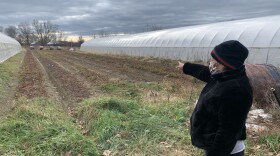Emmanuella perched her baby, Ethan, on her lap in the kitchen of her one-bedroom apartment in Agawam, Massachusetts. Thin streams of sunlight from her ground floor window peeked through the curtains and onto her face.
She recalled leaving Haiti when she was 14 years old.
“There was a lot of rape, violence, and kidnaping around me,” said Emmanuella, who asked us not to use her full name because she’s concerned for her safety.
Emmanuella said she ran to Chile a year later, where she met her husband, Walky, who’s also Haitian. She fled Chile in August 2020, because of violence against Haitians. Together, she said, they walked through nine countries. She stayed in Mexico for nearly a year until she got into the United States.
They made their way to Utah. That’s when Emmanuella found out she was pregnant.
She then stayed with a friend in Boston until her baby was born in November. She said she connected with Springfield’s Catholic Charities while in the hospital and they moved her, her newborn baby and Walky to Agawam.
Federal protection extended, but long waits remain
“There wasn't sufficient shelter available and or housing available to accommodate the families that had shown up in the Boston area,” Kathyrn Buckley-Brawner from Catholic Charities said.
Brawner said they received funding from the state's housing and community development department and office for refugees and immigrants to house Emmanuella and other Haitian migrants in Agawam.
We’re using the word migrant here to describe members of groups who are moving either within one country or across borders.
The Center for New Americans in Northampton is providing legal assistance for the Haitian migrants being resettled by Catholic Charities.
Their legal team has helped each Haitian migrant apply for Temporary Protected Status or TPS. It’s a federal designation allowing migrants to live in the U.S. for a certain amount of time without the risk of deportation. Once they get that protection, migrants can apply to work through an employment authorization document.
It was a big relief for many when the Biden administration extended TPS for some Haitians, allowing them to stay in the country without fear of deportation.
But Emmanuella and others are still waiting for these protections.
“It's anybody's guess how long it will take to get the authorization,” Laurie Millman, executive director for the Center for New Americans said. “It's hard to fathom that anybody's going to said no, but they don't have it, which means they do not have work authorization.”
A spokesperson from U.S. Citizenship and Immigration Services said, in an email, that individual processing times will vary depending on the complexities of each case and TPS applicants may experience delays.
Millman said they’ve been waiting about two months now.
That’s two months of stress that Emmanuella has endured not being able to work. Her friend, Andre, who lives a few units down from her on the ground floor, is struggling with the same thing.
'So damn frustrating'
Andre said he has a lot of responsibilities with a young child, so not having a work permit is his biggest issue.
Andre’s 3-year-old son was born in Brazil after he and his wife fled their home in Haiti’s capital, Port-au-Prince. They left Brazil, crossed the U.S.-Mexico border, and traveled to Massachusetts. They stayed with a friend in Boston for a while, but Andre said he didn’t feel comfortable taking up so much space.
His friend linked him up with Catholic Charities, which placed him and his family in Agawam.
Millman said she wants Andre, Emmanuella, and all of the Haitian migrants they’re trying to resettle to be able to work for their livelihood. She blames their waiting on the continued dysfunction of the U.S. immigration system.
“What's so damn frustrating is how inconsistent — I mean, this is a great window into how inconsistent and patchwork our immigration policy is, because the Afghans and the Ukrainians arrived with the authorization for employment,” Millman said. “The Haitians did not. So all of these people, like all other immigrants, desperately want to work. They do not currently have the legal authorization to do it.”
Millman said the extension for Temporary Protected Status is a significant step in helping migrants safely reside in the U.S. But, she warned, it can also leave many in legal limbo for years without providing a pathway to citizenship.
'You would not want to live in this moment'
For Emmanuella and Andre, they’re not just focused on getting TPS, but worry about their families many miles away.
Emmanuella said her mom fled to Chile in 2022 and seems safe there for now.
But Andre said his mom and siblings are still in Port-au-Prince. He said he feels ashamed talking about the violence in Haiti because he loves his country and most of all his city, but acknowledges the pain.
“People's lives are worth nothing,” he said. “They kidnap people. Even if you’re a patriot and you love your country, you would not want to live in this moment.”
Andre said he hopes to bring his family to the U.S., but the wait for protection from deportation makes long-term planning difficult.
Andre said he — like everyone — dreams of a better future: one where hopefully his child, mom, and siblings get to be together.
Aurelie Belinette contributed to this story.






